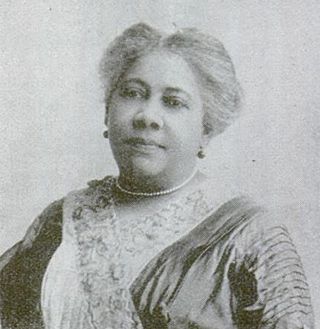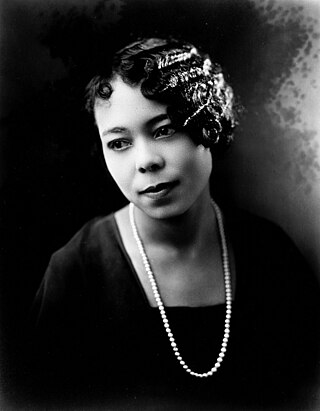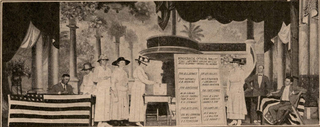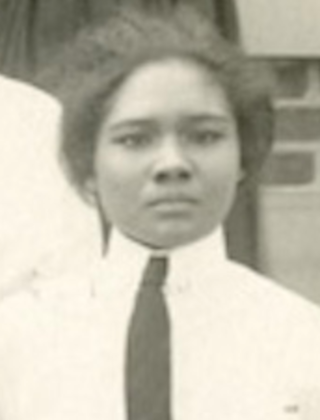Related Research Articles

Texas College is a private, historically black Christian Methodist Episcopal college in Tyler, Texas. It is affiliated with the United Negro College Fund. It was founded in 1894 by a group of ministers affiliated with the Christian Methodist Episcopal (CME) Church, a predominantly black denomination which was at the time known as the Colored Methodist Episcopal Church in America. They planned to provide for education of African-American students, who were excluded from the segregated university system of Texas. They planned a full literary, scientific and classical education for theology, normal training of lower school teachers, music, commercial and industrial training, and agricultural and mechanical sciences.

Mary Burnett Talbert was an American orator, activist, suffragist and reformer. In 2005, Talbert was inducted into the National Women's Hall of Fame.

Jessie Daniel Ames was a suffragist and civil rights leader from Texas who helped create the anti-lynching movement in the American South. She was one of the first Southern white women to speak out and work publicly against lynching of African Americans, murders which white men claimed to commit in an effort to protect women's "virtue." Despite risks to her personal safety, Ames stood up to these men and led organized efforts by white women to protest lynchings. She gained 40,000 signatures of Southern white women to oppose lynching, helping change attitudes and bring about a decline in these murders in the 1930s and 1940s.
The Crockett State School (CSS) was a Texas Youth Commission juvenile correctional facility in Crockett, Texas. The students at the state school had committed various crimes, including truancy, property crimes and crimes against persons. The Crockett State School, located on what was a 125-acre (51 ha) farm, is about 115 miles (185 km) north of Houston.

Zelia N. Breaux was an American music instructor and musician who played the trumpet, violin and piano. She organized the first music department at Langston University in Oklahoma and the school's first orchestra. As the Supervisor of Music for the segregated African American schools in Oklahoma City, Breaux organized bands, choral groups and orchestras, establishing a music teacher in each school in the district. She had a wide influence on many musicians including Charlie Christian and Jimmy Rushing, as well as novelist Ralph Ellison. Breaux was the first woman president of the Oklahoma Association of Negro Teachers and was posthumously inducted into the Oklahoma YWCA Hall of Fame, Oklahoma Women's Hall of Fame and the Oklahoma Bandmasters Association Hall of Fame. The Oklahoma City/County Historical Society made a posthumous presentation of its Pathmaker Award to Breaux in 2017.

The women's club movement was a social movement that took place throughout the United States that established the idea that women had a moral duty and responsibility to transform public policy. While women's organizations had existed earlier, it was not until the Progressive era (1896–1917) that they came to be considered a movement. The first wave of the club movement during the progressive era was started by white, middle-class, Protestant women, and a second phase was led by African-American women.

Rosa L. Dixon Bowser was an American educator. She was the first African-American teacher hired in Richmond, Virginia. She organized the Virginia Teachers' Reading Circle, which became the Virginia State Teachers Association, the first organization representing black teachers in Virginia, serving as the organization's president from 1890 to 1892. Bowser was president of the Woman's Christian Temperance Union in Virginia, as well as founder and first president of the Richmond Woman's League. She was a correspondent for the magazine The Woman's Era, and wrote essays for national publications.

The South Carolina Federation of Colored Women's Clubs (SCFCWC) was an African American women's club founded in 1909 in South Carolina. The umbrella organization was created by Marion Birnie Wilkinson, Sara B. Henderson, Lizella A. Jenkins Moorer, Celia Dial Saxon and other women who met at Sydney Park Church in Columbia. They adopted the motto of the National Association of Colored Women's Clubs (NACWC), "Lifting as We Climb." Wilkinson became the first president and worked towards improving education and living conditions for black people in South Carolina. The organization grew to have twenty-five hundred members in 1922. One of the major accomplishments of the SCFCWC was the creation of the Wilkinson Home for Colored Girls in Cayce. The home was originally for girls who had been deemed "delinquent" and later housed orphans.
Ada Belle Dement was an American educator and clubwoman. In 1941, she became president of the National Association of Colored Women's Clubs (NACWC).

The Iowa Federation of Colored Women's Clubs (IFCWC) was an umbrella organization serving African-American women's clubs in Iowa. The motto of IFCWC was "Sowing Seeds of Kindness", and the organization was affiliated with the National Association of Colored Women. The club produced a journal called the Iowa Colored Woman. IFCWC sent delegates to represent the state at national conventions and opportunities such as "Colored Women's day" at the 1939 New York World's Fair. The IFCWC is also known for creating a black women's dormitory for the University of Iowa before the school was fully integrated. The building has been listed on the National Register of Historic Places.

Eva Carter Buckner was a prominent African-American suffragist, poet, and songwriter.

Sadie L. Adams was an African-American teacher, suffragist, and clubwoman. She was one of the first women to serve on an election board in Chicago and one of the founders of the Douglas League of Women Voters. In 1916, she served as a delegate from Chicago's first black suffrage organization, the Alpha Suffrage Club, to the National Equal Rights League conference. She was elected president of the Chicago and Northern District Association of Colored Women's Clubs in 1921, serving into 1934. She was also involved in various charity clubs and organizations that helped to engage women in war work during World War I, provide resources for underserved youth, and increase suffrage for Black women.

Ione Elveda Wood Gibbs was an American educator, journalist, and clubwoman. She served as vice-president of the National Association of Colored Women from 1912 to 1914.

Vivian Osborne Marsh was an American clubwoman based in San Francisco, California. She was president of the California State Association of Colored Women, and national president of Delta Sigma Theta.

Women's suffrage efforts in Texas began in 1868 at the first Texas Constitutional Convention. In both Constitutional Conventions and subsequent legislative sessions, efforts to provide women the right to vote were introduced, only to be defeated. Early Texas suffragists such as Martha Goodwin Tunstall and Mariana Thompson Folsom worked with national suffrage groups in the 1870s and 1880s. It wasn't until 1893 and the creation of the Texas Equal Rights Association (TERA) by Rebecca Henry Hayes of Galveston that Texas had a statewide women's suffrage organization. Members of TERA lobbied politicians and political party conventions on women's suffrage. Due to an eventual lack of interest and funding, TERA was inactive by 1898. In 1903, women's suffrage organizing was revived by Annette Finnigan and her sisters. These women created the Texas Equal Suffrage Association (TESA) in Houston in 1903. TESA sponsored women's suffrage speakers and testified on women's suffrage in front of the Texas Legislature. In 1908 and 1912, speaking tours by Anna Howard Shaw helped further renew interest in women's suffrage in Texas. TESA grew in size and suffragists organized more public events, including Suffrage Day at the Texas State Fair. By 1915, more and more women in Texas were supporting women's suffrage. The Texas Federation of Women's Clubs officially supported women's suffrage in 1915. Also that year, anti-suffrage opponents started to speak out against women's suffrage and in 1916, organized the Texas Association Opposed to Woman Suffrage (TAOWS). TESA, under the political leadership of Minnie Fisher Cunningham and with the support of Governor William P. Hobby, suffragists began to make further gains in achieving their goals. In 1918, women achieved the right to vote in Texas primary elections. During the registration drive, 386,000 Texas women signed up during a 17-day period. An attempt to modify the Texas Constitution by voter referendum failed in May 1919, but in June 1919, the United States Congress passed the Nineteenth Amendment. Texas became the ninth state and the first Southern state to ratify the Nineteenth Amendment on June 28, 1919. This allowed white women to vote, but African American women still had trouble voting, with many turned away, depending on their communities. In 1923, Texas created white primaries, excluding all Black people from voting in the primary elections. The white primaries were overturned in 1944 and in 1964, Texas's poll tax was abolished. In 1965, the Voting Rights Act was passed, promising that all people in Texas had the right to vote, regardless of race or gender.

Maude Brockway was an American teacher, milliner, and activist. She was born in Arkansas in 1876 and moved to Indian Territory after completing her education at Arkansas Baptist College. Initially, she worked as a teacher around Ardmore, Chickasaw Nation and then opened a hat-making business. In 1910, she moved to Oklahoma City and became involved in the Black Clubwomen's Movement. She was one of the founders of the state affiliate, Oklahoma Federation of Colored Women's Clubs and city chapter, Oklahoma City Federation of Colored Women's Clubs of the National Association of Colored Women's Clubs. She served as president of the city chapter from 1925 to 1950 and of the state federation from 1936 to 1940, as well as holding offices in the national organization.
Arsania M. Williams was an American educator and clubwoman based in St. Louis, Missouri. She taught for over fifty years in segregated schools, and was president of the Missouri State Association of Negro Teachers, the Missouri Association of Colored Women, and the St. Louis Association of Colored Women. She held national leadership roles in the National Association of Colored Women (NACW).

Frederica Chase Dodd was an American educator, social worker, and clubwoman, one of the founders of Delta Sigma Theta.
References
- 1 2 3 4 "Historical Background". TAWC History. Texas Woman's University Libraries. Archived from the original on 2017-02-05. Retrieved 4 February 2017.
- ↑ "Murray to Talk". Lubbock Morning Avalanche. 12 November 1931. Retrieved 5 February 2017– via Newspapers.com.
- ↑ Winegarten, Ruthe (4 February 2017). "Texas Association of Women's Clubs". Texas Handbook Online. Texas State Historical Association. Retrieved 4 February 2017.
- 1 2 3 4 "Texas Association of Women's Clubs Digital Archive". Gateway to Women's History. Texas Woman's University Libraries. Retrieved 5 February 2017.
- 1 2 Smyrl, Vivian Elizabeth (12 June 2010). "Crockett State School". Handbook of Texas Online. Texas State Historical Association. Retrieved 5 February 2017.
- ↑ "Texas Federation of Colored Women's Drive". The Dallas Express. 11 February 1922. Retrieved 5 February 2017– via Newspapers.com.
- ↑ "Special Negro Days Set at Fair". Longview News-Journal. 19 August 1948. Retrieved 5 February 2017– via Newspapers.com.